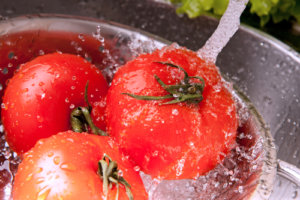 Proper washing techniques are necessary in order to reduce the potential spread of pathogens and microbial food hazards in the distribution industry. As most contamination of fruits and vegetables lies on the surface of the produce, this is an important risk management step. Therefore, in order to prevent contaminating the entire load of produce, which is both costly and damaging to your reputation, heed the following advice and ensure your operation is secured with a MI Produce Distributor Insurance Program.
Proper washing techniques are necessary in order to reduce the potential spread of pathogens and microbial food hazards in the distribution industry. As most contamination of fruits and vegetables lies on the surface of the produce, this is an important risk management step. Therefore, in order to prevent contaminating the entire load of produce, which is both costly and damaging to your reputation, heed the following advice and ensure your operation is secured with a MI Produce Distributor Insurance Program.
Use appropriate wash methods.
If the produce is not subject to bruising, wash these items vigorously with brushes. Remember to frequently clean the brushes to prevent the spread of bacteria. Next, understand that different methods are used to wash different types of produce, including submersion, spray, or both. Spray wash treatments may be less likely to directly spread microbial contaminants. However, spray wash treatments may spread pathogens by splashing or by aerosol, or on food contact surfaces, such as brushes and utensils. Further, if water is contaminated during washing and then reused, it can be a vehicle for spreading contamination, says the FDA.
Maintain efficacy.
Use antimicrobial wash water to reduce microbial populations up to 100 percent. Further, sometimes more than one wash is necessary. For example, packers may consider using an initial wash treatment to remove the bulk of field soil from produce followed by additional washes and/or a sanitizing dip and a final fresh, clean water rinse, says the article.
Use the correct wash water temperature.
For apples, celery, and tomatoes, the wash water must be a higher temperature than the produce itself to prevent them from absorbing water into their plant material and causing internal pathogens. Be mindful of these types of washing techniques that are required for certain produce loads.
Use alternative washing methods for water-sensitive produce.
The FDA states that Dry cleaning (e.g., brushing, scraping, blowing air) may be used with some produce that cannot tolerate water. In these cases, periodic equipment cleanup and sanitation will reduce the potential for cross-contamination.
At Capital Insurance Group, we specialize in protecting the wholesale and distribution sector. With over 35 years of expertise, we have served Southeastern Michigan businesses with quality and affordable solutions. To learn more about the products you need to mitigate risk and protect your employees, contact us today at (888) 296-0418.

